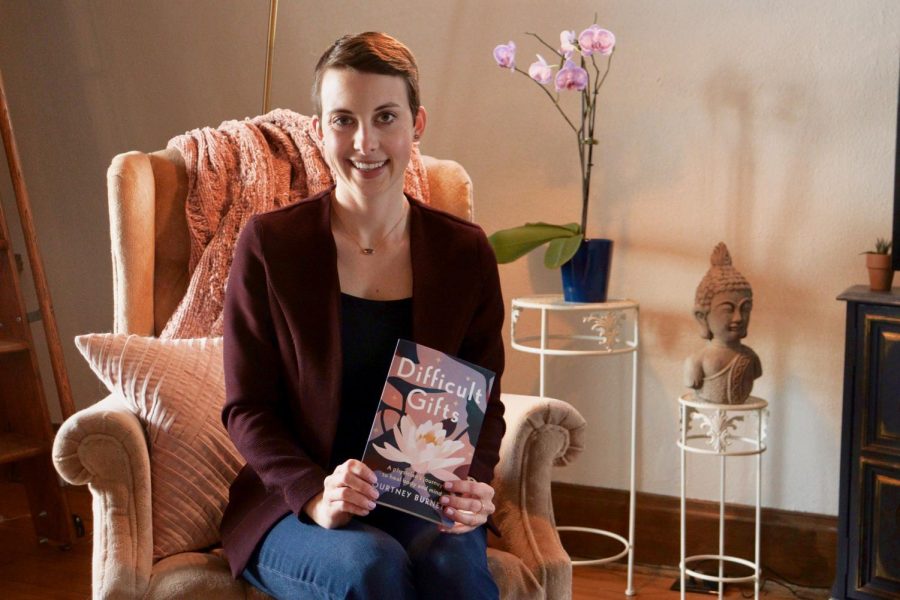“My simple advice is this. Plan a little, but don’t plan too much. This exact moment is the only moment you’re absolutely guaranteed to have. Look around — see how beautiful it is?”
That is one of the profound quotes from University of Minnesota graduate and Internal Medicine Chief Resident Courtney Burnett in her upcoming memoir “Difficult Gifts: A Physician’s Journey to Heal Body and Mind.” A first-time author, Burnett delves into the perils and silver linings of her recent battle with brain cancer.
The book, set to release Feb. 8, is an intimate and vulnerable telling of Burnett’s path from physician to patient, from fear to courage and pain to positivity.
A friend and colleague of Burnett’s, Dr. Reut Danieli admires Burnett’s resilience and courage in the face of her life-threatening illness.
“Her tenacity comes from this natural fight inside of her that will always fight for others before she fights for herself,” Danieli said. “She took such a horrible situation in her life, and not only improved her own life by finding this purpose but also strives to make other people’s lives better.”
Burnett first learned of her malignant brain tumor through a self-diagnosis nearly one year ago.
While in the third year of her internal medicine residency, Burnett spent the start of 2020 studying Eastern and complementary medicine in Thailand. It was there where she first began to experience abnormal neurological symptoms.
Burnett, in her words, “put on her doctor hat” and evaluated her symptoms as if consulting a patient. Upon realizing that what she was experiencing were potentially focal seizures, she rushed immediately to a Thai neurology clinic for an MRI scan.
“As weird as it sounds, when I saw that scan, I was in full-doctor mode,” Burnett said. “All I could think was, ‘Oh, you know, shoot, I’m gonna have to tell this patient some really bad news because this person has a giant brain tumor.’ And it took me a few minutes to actually realize it was me.”
Burnett immediately returned to Minnesota to undergo her first brain surgery and biopsy.
Six weeks of radiation therapy, six months of chemotherapy and a second intensive brain surgery later, Burnett’s cancer is currently stable. She has been able to finish her residency, as well as her memoir.
Burnett cites the beginning of her work on “Difficult Gifts” during her time in Thailand, where she began a blog and documenting her experiences. With no cell phone service, she started the blog to keep family and friends updated.
Her blog soon began to grow in popularity and gain an unexpected following. Readers wrote back, showing their appreciation for Burnett’s vulnerability and relatability, even to those having no experience with cancer.
Victoria Petelin, publishing project manager for “Difficult Gifts,” remarked on Burnett’s writing talents and work ethic during her time writing and editing her memoir.
“I would say that Courtney is a very straightforward person; she’s very pragmatic,” Petelin said. “She’s a very quick learner. We often say that publishing a book is like launching a small business, and throughout the entire way, she was scrappy and motivated and engaged.”
Burnett’s close friend Marisa Feld echoed this respect for Burnett’s drive and commitment in her work and treatment. “I don’t know when she sleeps,” Feld said. “She was doing her residency, she was dealing with her diagnosis, she was writing the blog and then writing a book. She is definitely very ambitious and driven.”
Along with her memoir, Burnett shared her story through various speaking engagements with brain cancer support groups, hospitals, and various other support networks. She has decided to donate 10% of the book’s profits to brain tumor research and patient care networks.
Looking forward, Burnett plans to finish her chief residency at the University of Minnesota this June and begin work as a primary care physician. She continues to write her blog and hopes to publish more pieces in the future.
“I just want to share my story in the hopes that it will help people who are either coping with cancer or just honestly coping with any sort of unexpected challenge that life has thrown at them,” Burnett said. “The biggest takeaway that I hope people get is that suffering is really a universal concept. We all experience it differently, but I think that suffering is a part of life, and despite that, we can find happiness. Happiness is the key.”








